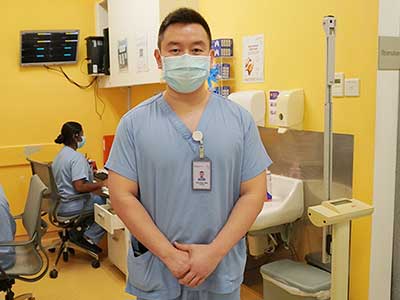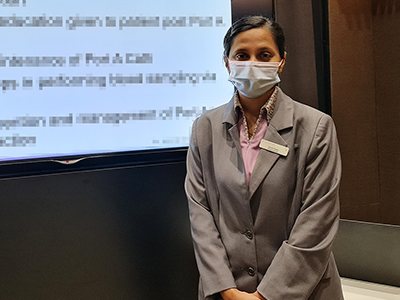.2022-07-25-10-36-54.jpg)
A stalwart with over two decades of experience in handling oncological, surgical, and medical patients in both Singapore and India, Karthiga Vinayagam exemplifies how one’s passion for nursing does not have to diminish with time.
Hailing from Tamil Nadu, a South Indian State that’s home to Chennai, Karthiga Vinayagam (known as Karthiga by her colleagues) has accumulated a wealth of nursing experience across various clinics and hospitals in India and Singapore respectively. She is currently based in IPS9 handling various surgical cases.
Her practice in Singapore started in 2005 when she received her Certificate in Oncology. Though she initially struggled to adapt to cultural norms in Singapore — to the point where she even had trouble recognizing and pronouncing doctors’ names, Karthiga would eventually find her footing thanks to nurses and clinicians who guided her along the way.
She continued her practice when she returned to India in 2012, performing both medical and orthopedic treatments in both clinical and inpatient settings. In 2018, Karthiga made her way back to Singapore, and joined as an oncological nurse at Farrer Park Hospital.
Oncology was not something that Karthiga actively chose to specialize in. According to her, it's something that “just happened.” After dismissing the option of engineering because she “prefers a job with people rather than machines”, Karthiga decided to go for nursing so that she could appease her father by working with medicine while still interacting with people. Despite that, Karthiga proudly states, “I have never regretted working in a ward that handles mainly oncology cases. For me, the interest will always be there because there are always new oncology drugs and treatments coming in.”
One thing that Karthiga appreciates most about her job is the perspective that it brings. “Watching patients deteriorate without getting better made me ask questions about everything from life and how I take care of my health. It makes me re-examine my lifestyle, whether I’m having enough healthy breaks, healthy meals, and exercise,” she muses.
When asked about how different is oncology nursing from other areas of nursing, Karthiga pertinently highlights that, “In other departments, patients get better. But here, patients' condition can be quite unpredictable and the disease itself can be debilitating. They also need more post-op care than general patients. It may be adhering to a specific diet, or even taking blood tests and receiving transfusions daily if their blood counts are low. This makes me cherish the time that I have with them a lot more.”
Most professionals lose the initial drive that they once had from the outset. Karthiga, on the other hand, still draws great satisfaction from contributing to something meaningful. “Everyday I connect with people. Even if I work overtime, my father will remind me that I’m doing good by helping others,” she says.
It is perhaps these reminders that allow Karthiga to push through the toughest of times. While she admits to pondering on negative feedback from patients and doctors, Karthiga is able to bounce back easily by taking joy from simple pleasures such as listening to music on the MRT, talking to her family, and taking a shower when she’s home.
“ I accept that patients become unhappy or dissatisfied, because they are in pain and going through their own set of challenges and difficulties. For example, they might get stressed if a doctor tells them that their cholesterol levels are high. I know I cannot keep everyone happy all the time. What satisfies one patient may not satisfy the next,” she said when asked about her perspective on handling challenges at work.
Karthiga also makes sure she takes time to keep a positive attitude and outlook. Despite clocking thousands of steps on the job, she still takes time to walk closely with nature, meditate, and even go on the occasional bike ride.
Though she has spent many years in the profession, Karthiga still vividly remembers certain patients whom she formed strong connections with. One 27 year-old male patient left an impression because he would frequently ask Karthiga if she had had breakfast, even before she greeted him.
These simple yet significant interactions helped Karthiga understand her patient’s emotional needs better. “When he went to the ICU for three to four days, he couldn’t recognize anyone other than his mother. When I heard that he was mentioning my name, I went into the ICU and held his hand for a few minutes to comfort him. That really touched my heart,” Karthiga fondly recalled.
Karthiga says she will continue staying in the nursing profession for as long as she is needed, specifically contributing back to oncology, even if an opportunity to explore her interest in teaching presents itself. “I want to tap into my experience and guide my colleagues and newcomers.”
She also advises younger nurses to stay updated on the latest changes in medicine. In particular, she stresses the importance of postgraduate studies and how it will open up the options of nurses. “Postgraduate studies will deepen your knowledge, which you can then apply and provide even better nursing services, no matter what you eventually specialize in,” she stressed.
Even in her 40s, Karthiga remains a reliable team player. She intends to extend her preceptorship by teaching nursing to her juniors as well. She may return to India for business in the near future, but what’s certain is that she remains fervently dedicated to the mission of nursing.

I Like Being an Emergency Nurse: Here's Why
Armed with an intrinsic passion to serve and a fond memory of his nursing aunt whom he describes as “excellent clinician with outstanding leadership and administrative abilities”, Assistant Nurse Clinician Nicholas Zhu entered emergency nursing.
Read his story

Helping To Make Chemotherapy a Little Less Daunting
They say that nursing is a career of compassion, and no one embodies this better than Sarah Sharmala, Nurse Educator and a certified oncology nurse.
Read her story